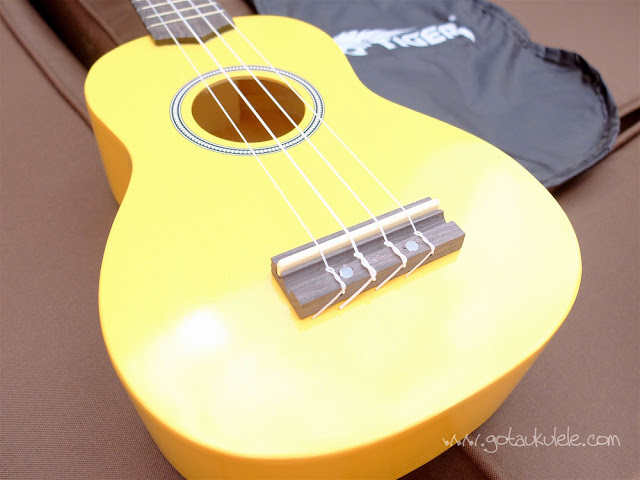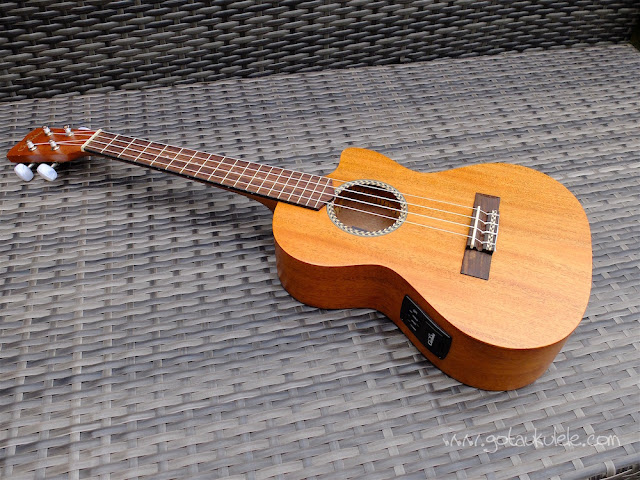A difficult and contentious topic this one, but one I am seeing discussed more and more on social media. Are there too many ukulele festivals in the calendar year?
Some will immediately agree with that statement, some will recoil in horror. I would like to think that Got A Ukulele has established a name for itself in not shying away from the difficult subjects and doing a certain amount of telling it like it is. I think it would therefore be wrong of me to avoid the subject. Bear with me....
Regular readers will know that for the last few years I have been compiling the Ukulele Festival Calendar on this site. Even a swift glance at it will show you just how many festivals there are these days. Pretty much one per weekend through the summer months and in several cases, more than one on the same weekend. I should also just make clear that I think the congestion is related mainly (if not solely) to the ukulele festival scene in the UK. It's not anywhere near as busy in mainland Europe, and whilst there are a lot of festivals in the USA, that kind of makes sense as the country is so large.
But the UK is a small place geographically, and has a small (ish) population, so when you have one per weekend (or more than one) so consistently, and ultimately not that far apart in distance - is there a danger of the whole thing becoming overloaded?
There are several ways of looking at this, and clearly there is a clear distinction between the artists that perform and the punters that go to watch.
For artists, naturally they WANT to play festivals and be heard. It's what they do, and if not their actual job, it's certainly their devoted vocation. It's totally understandable that they want to perform and perhaps in that sense the more the merrier? Perhaps. But I actually think there is another angle worth considering and that surely has to be over-exposure on the circuit? If you are the sort of person that likes to go to lots of festivals, having the same acts on the bill of each one would (for me at least) get extremely repetitive. I prefer variety and certainly wouldn't go to non-ukulele music festivals if they all had the same acts each time. Perhaps the artists themselves are aware of this and try not to appear everywhere, but I guess it's hard if you are doing very well and every festival is asking you to play. Artists dont like turning down gigs!
There are also a couple of angles on the punter side of things. On the one hand a large number of festivals spread around the country gives more people a chance to go and see one without ridiculous travelling times. In fact some people struggle with travelling full stop, so perhaps one in every town makes sense. There are people who adore filling their summers with festival after festival, and for them, the calendar is a real treat. On the other hand though, there are the people who are still addicted to the ukulele and for whom going to quite so many events would just not be financially possible. These things cost and it certainly adds up. So perhaps having so many becomes a temptation they just can't realise, and then find themselves bombarded on Facebook with pictures of their friends enjoying what they couldn't justify. I know a few people in this camp and feel 'left out' by not being able to go to more.
And aside from the artist / punter side of things, it's worth considering another important point. Just how many ukulele receptive audience members are there in the UK? The answer to me is clear, but it also is an answer that many people I dont think actually want to hear. Whilst I dont know of any reliable census information to be definitive, it is surely a fact that the number of ukulele players in the UK is TINY compared to general music fans. It's a niche thing, pure and simple. If you are within the bubble it may be hard to see this, but it's true. This is no Glastonbury (175,000 attendees), or even something more niche like a folk Festival (Cambridge gets an estimated 10,000, Cropredy and estimated 20,000). No, ukulele festivals tend to attract anything from small multiples of 10, through to a few hundred and in the case of the biggest ones, perhaps 1,000 or so. These are small numbers of potential customers, and expecting those numbers every weekend of the year (pretty much) is a big ask I would say. And at the rate that the small festivals are developing into big ones, I just dont see how the audience numbers are sustainable for everyone.
Looking back a few years, there were still lots of ukulele events around, but as I say, it's the scale of the festivals seems to have changed in the last 1-2 years. In the past you had a couple of large festivals and then a host of smaller, often free or charitable events in towns and villages around the UK. The larger festivals had the bigger names, often international players included, but the local events served to showcase up and coming talent and local clubs more (I even ran one myself). All were enjoyed, and there were far fewer cases of people having to think 'which ticketed event do I choose to go to'. These days some of those local events still happen, but they now also find themselves competing with a big increase in larger, ticketed events themselves. And if you are running a ticketed event you DO have costs. You are either needing to make money, or in the case of many, not make a profit but to avoid LOSING money. And to not lose money means getting people through the door. And so lies the problem. We have a finite number of weekends in the year, and a finite and small number of potential customers. Some will go to lots, but many can't afford that and need to pick and choose. And that surely puts pressure on the organisers with some struggling to get the numbers they need to avoid being in debt. That just seems a crazy situation. The concept of 'build it and they will come' just really doesn't apply when there is cost involved and the country is on the verge of heading into another recession. And bear in mind that in to 2017 it looks like the UK will be going into recession. There will be less disposable money around for most people, and the value of the pound in your pocket will be far less. All in all it's not conducive to the survival of so many large events.
Like all my rants, some people misconstrue them as me telling people 'what to do'. They aren't and it's sad that I need to point out that they are just discussion pieces that I hope make people think. And that's the case here. It's not for me, or anyone else to tell any festival team what to do, or tell small festivals that they can't grow. They can do whatever they like. I am however entitled to an OPINION of my own, and I have been saying this for some time. I personally think there are too many large events, and if they continue growing in the way they have in 2016, I think that will ultimately (and fairly swiftly) be to the detriment of all ukulele festivals. And that will affect both punters AND artists alike. And I think that would be really sad - both for punters and organisers. I'd love to wave a magic wand to allow every event to be over-subscribed, but that's impossible.
So what do I suggest? Well certainly more of the obvious - and thats COMMUNICATION between organisers. There really should be no need for events to clash with a bit of advance communication, but in fact clashing isn't the only problem here. Having large events week after week after week must surely affect which ones many punters choose to go to. I think that communication should extend to keeping the larger festivals spread out as much as possible. I know a few festival organisers and I know how much work they put in to doing exactly this outreach work. Clearly though, a look at the calendar shows that this doesn't apply to everyone. And if everyone is not playing nice, the system then falls down. It's the 'this is why we can't have nice things' argument. The few making it difficult for the many.
For me, in a country the size of the UK with a ukulele fanbase as big as I think it is, I would suggest (please - it's only a suggestion!!) that a couple of large festivals in England, plus one in Scotland, and one in Wales would be plenty. Then fill the rest of the year with smaller free events for local clubs to try to get on the ladder. Kind of like it used to be really....
And I'm having second thoughts about running the festival calendar in 2017. As much as it serves to help punters, I had always hoped that it would help organisers know what is happening where and when to help avoid congestion and clashes. Clearly that didn't work. No doubt it's been helpful for punters, but less so for organisers.
But as I say, it's not for this site to tell anyone what to do. I do hope though it creates some discussion and I would very much like to hear your own perspectives. Are you a punter that relishes the thought of attending something every week, or are you the sort that can only justify one and has to think very carefully about what to miss out on?
(nb - I am happy to take comments on this post, but any comments naming names on festivals wont be published. This is a general discussion post and not intended to target any particular events)
- STOP PRESS -
I kind of knew that this piece would create some debate and difference of opinion. That was the point - to get those with differing opinions actually talking about it. Because there ARE differences of opinion. Sadly I am seeing those who think the number of festivals is 'just fine' are now deliberately scoffing at those who dare say different. Making out that because I dare to question what we have is in some way troublemaking. This morning this led to one festival organiser claiming publicly that I am 'hoping ukulele festivals will fail'... The fact that this piece has the intention of avoiding EXACTLY THAT happening, seems lost on people. That's not only pretty stupid, but it's pretty hurtful.
Yes, of course - if you love going to lots of ukulele festivals, of course you will support the busy calendar - the blog post even SAYS that as being a valid point of view, but to just ignore any contrary position as not being relevant is crazy. I've had direct comments in praise of the piece from people who say they have been 'totally put off' ukulele festivals full stop because of the repetitive nature of events. And I've had even more messages of support from people who simply cannot afford to go to more than one. And that final point was perhaps my main concern - you can bleat all you like about how great it is to have lots of festivals, but if they start losing money because they cannot get punters through the door, you will soon have very few again....
© Barry Maz




















